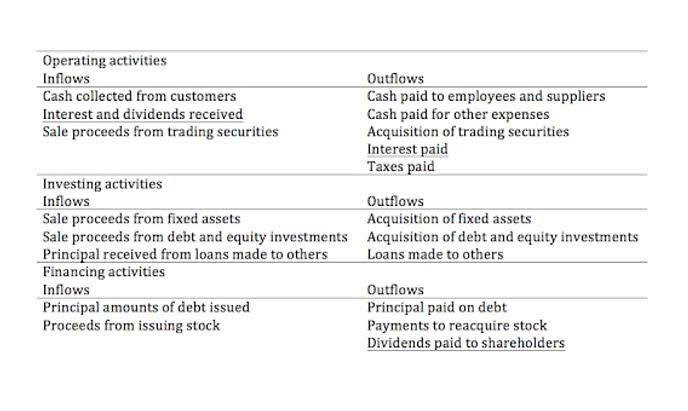Certified Public Accountant vs Accountant: What Are the Differences?

In recent decades, however, accounting research and education have taken a broader view—laying the foundation for accounting’s expanding scope and global outreach. It is a highly influential discipline, albeit not always well-understood or appreciated. Students repeatedly ask this question when pondering whether an accounting career is the right choice for them. For recruiters, a failure to move beyond a traditional technicist accounting definition may presage a growing risk of deterring interest from graduates with broader interests and agendas. The information presented here is true and accurate as of the date of publication. DeVry’s programmatic offerings and their accreditations are subject to change.

Who Are Accountants, and What Are Their Responsibilities?
WGU’s Master of Science in Accounting degree delves deeper into topics like accounting research and critical thinking, data analytics, fraud and forensic accounting, and management communication. You can choose to specialize in one of four concentration areas, including financial reporting, management accounting, auditing, and taxation. Whether you want to become a corporate tax specialist, auditor, financial analyst, or another type of financial professional, a degree from WGU can equip you with the industry-relevant skills you need to thrive. If you’ve got a knack for numbers and want to use your finance savvy to help others, a career as an accountant or CPA may be right for you.

Responsibilities
- Both CAs and CPAs must fulfill Continuing Professional Education (CPE) requirements to maintain their credentials.
- CPAs must complete continuing education hours every year to maintain their license and keep up with new laws and accounting practices.
- The length of time it takes to become a CPA depends on the personal situation of the candidate, their level of education, the state they live in, and the state’s qualifications.
- CPAs have the legal authority and expertise to handle these specialized tasks, making them indispensable for larger businesses or individuals with complicated financial situations.
- A fiduciary is a person or entity with legal authority to act on behalf of another.
If you plan to work as an accountant within a private company, such as a small or medium sized corporation, becoming a CPA may not be a job requirement. To maintain licensing and certification, CPAs must make a commitment to staying up to date on their education and any new industry developments, which is known as continuing professional education (CPE). The amount of CPE you must complete will vary based on the state in which you are licensed. Bureau of Labor Statistics (BLS), Accountants and Auditors as of May 2021, difference between accountant and cpa retrieved on May 16, 2023.
Meeting Ethics and Licensing Requirements
If you recently opened a small business, you may choose to handle the accounting on your own. As your business expands, though, you will require the services of a financial advisor and tax planner. While a professional accountant will assist you with bookkeeping and payment management, a CPA will assist you with your business’ growth, as well. A fiduciary is a person or entity with legal authority to act on behalf of another. CPAs are considered to have the legal responsibility and authority to act in the best interests of their clients.


Even if your company has a highly proficient staff accountant, you would always need a CPA. If we talk about an ideal case scenario, every business should use both a CPA and an Accountant to handle things efficiently. Living on campus is all about you getting the whole academic experience—from getting to class and extracurricular activities, late-night study sessions, creating new income summary meaningful friendships, and learning more about yourself.
- Most states require one to two years of relevant work experience under the supervision of a licensed CPA.
- Earning the CPA designation requires dedication, education, and passing a rigorous exam, but it opens doors to diverse career opportunities and higher earning potential.
- It impacts organizations, people, and nature depending on what information is collected and reported—as well as what information is not collected or reported.
- In either case, you’ll first need to earn a bachelor’s degree in a related field, such as a Bachelor of Science in Accounting.
- The CPA designation is regulated in the United States, but similar accounting credentials exist worldwide, such as the Chartered Accountant (CA) in Canada and the UK.
However, the Accounting number format displays zeros as a dash, making those cells easier to distinguish from positive or negative values in a large accounting spreadsheet. You may have noticed a theme with the Currency number format—it usually behaves in the same way as the Number format, except for the addition of a currency symbol before the value and two decimal places by default. For the same reasons, values formatted with the Accounting number format are also right-aligned by default, though the currency symbol aligns to the left of the cell.
- Both CPAs and chartered accountants provide advanced accounting services such as auditing financial statements, filing corporate taxes, and offering financial guidance.
- Accountants have bachelor’s degrees in accounting while a CPA, or Certified Public Accountant, must meet educational requirements and pass a series of exams.
- There is no substitute for good advice when you are forced into a unique situation that requires specialized knowledge and expertise.
- In short, when you’re facing big financial challenges, having a CPA on your side can make all the difference.
- There are many professionals who play their parts in building a supportive financial foundation for individuals, families and businesses.
An internship can give you an inside look at the difference between an accountant and a CPA, and what you can expect from a typical day on the job. The agency tasked with tracking employment and salary data in the U.S. is the U.S. In their projections, the BLS makes no distinction between CPAs and non-certified accountants. The CPA certification exam generally is considered difficult, and less than 20% of test-takers pass all four sections the first time they take them. Explore a range of job search tools and resources to achieve your dream career goals. Join the fastest-growing talent platform in the APAC region and expand your professional network.
FAQ: Accountant vs CPA: What’s the Difference?
Our courses are online and available 24/7, bookkeeping for cleaning business allowing you to get a degree while maintaining personal or professional responsibilities. Even better, our competency-based model means that you can progress through courses as soon as you demonstrate mastery of the material. WGU’s bachelor’s in accounting program contains career-aligned courses in taxation, financial accounting, auditing, organizational behavior, economics, and other essential subjects. As we mentioned, CPAs are accountants who have met specific state licensing requirements. The requirements for CPAs differ based on the state, but at a minimum, they typically require a bachelor’s degree in accounting, experience requirements, and passing the CPA exam.
Tax Attorney Continuing Education
By earning and maintaining their licensure, CPAs demonstrate a high level of proficiency in their field. They can also represent clients before the Internal Revenue Service, provide attestation services and submit financial reports of publicly traded companies to the SEC. An accounting professional who has earned the CPA designation can take on a broader range of career paths than someone who is not a CPA.